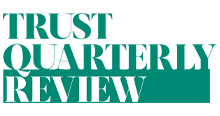
Business as usual…
From a practical standpoint, this edition includes a guide to the ‘numerous and dynamic’ planning tools available to those having to harmonise Shari’a law with trusts; examines the tax implications for trusts in Poland; and provides a detailed analysis of the effectiveness of anti-Bartlett clauses following the decision of the Hong Kong Court of Final Appeal in Zhang Hong Li v DBS Bank.
It is business as usual in the June 2020 edition of the Trust Quarterly Review. On the international front, we bring you pieces dealing with issues ranging from the taxation of trusts in Poland to cryptocurrency in New Zealand and from document production in London to anxiously awaited authority from the highest court of Hong Kong. This quarter’s articles provide up-to-date reviews of recent case law on the definition of property in the trust context, legal professional privilege and data protection, and the effectiveness of anti-Bartlett clauses. We also have a fascinating consideration of how best to harmonise Shari’a law and equity. This quarter’s book review, of Snell’s Equity, 34th edition, celebrates the 150th anniversary of a textbook that is indispensable to trust practitioners.
Maria Muzarowska examines the recognition of trusts in Poland, a country which has not ratified the Hague Convention of 1 July 1985 on the Law Applicable to Trusts and on their Recognition and which does not, therefore, recognise the concept of a trust. Maria looks at the tensions this creates in this time of international mobility, growing wealth and increased popularity of trust structures. The article concentrates, by way of case studies, on the particular difficulties determining the tax consequences of trust structures under Polish law.
Ziva Robertson TEP and Georgia Angus provide an analysis of the decision of the Court of Appeal of England and Wales in the case of Dawson-Damer v Taylor Wessing LLP. Important questions of legal professional privilege and its interplay with data protection are considered, along with the question of what constitutes a ‘filing system’ under the data protection legislation. Further, consideration is given to the practical results of this ruling for lawyers, trustees and beneficiaries.
John Brown TEP and Vicki Ammundsen TEP provide a detailed review of two different but related trustee directions applications heard by the High Court of New Zealand. First, the case of Ruscoe v Cryptopia Limited (In Liquidation), a discussion about the meaning of ‘property’, whether cryptocurrency meets that definition and whether it is thus capable of forming the subject matter of a trust. Second, the unusual factual scenario in the case of Darlow v Raymond, dealing with the question of whether powers in the form of governance responsibilities are property.
‘In spirit and in law’, written by Mustafa Hussain, discusses the best approaches to interweaving Shari’a law with common-law trusts, supported by the historical similarities between Shari’a and equity. The piece proposes practical ways to work effectively in both spheres simultaneously, with a view to ‘prudent and insightful modern practice’.
The long-awaited decision of the Final Court of Appeal of Hong Kong in the case of Zhang Hong Li and others v DBS Bank (Hong Kong) Ltd is broken down by leading counsel for the trustee in that case, Shân Warnock-Smith QC TEP. The trusts world held its breath as, at first instance and unanimously in the Hong Kong Court of Appeal, it was held that trustees are under a high-level ‘residual duty’ to interfere with the management of a company, despite the existence of an otherwise valid anti-Bartlett provision. Thus, the effectiveness of such clauses in trusts the world over was called into question. Has the Hong Kong Court of Final Appeal resolved that issue once and for all?
Last, but definitely not least, we bring you a review of the 34th edition of Snell’s Equity; a profoundly important treatise in our chosen area of the law that now finds itself in its 150th year. Dr Daniel Clarry TEP confirms that a particular area of interest is the discussion of AIB Group (UK) plc v Redler & Co Solicitors and the operation of equity when personal claims are made against defaulting trustees, which has reignited academic debate on this topic. This lively and knowledgeable book review by Dr Clarry will surely have practitioners, academics and students alike clamouring for a copy.
The content displayed here is subject to our disclaimer. Read more

Connect with us